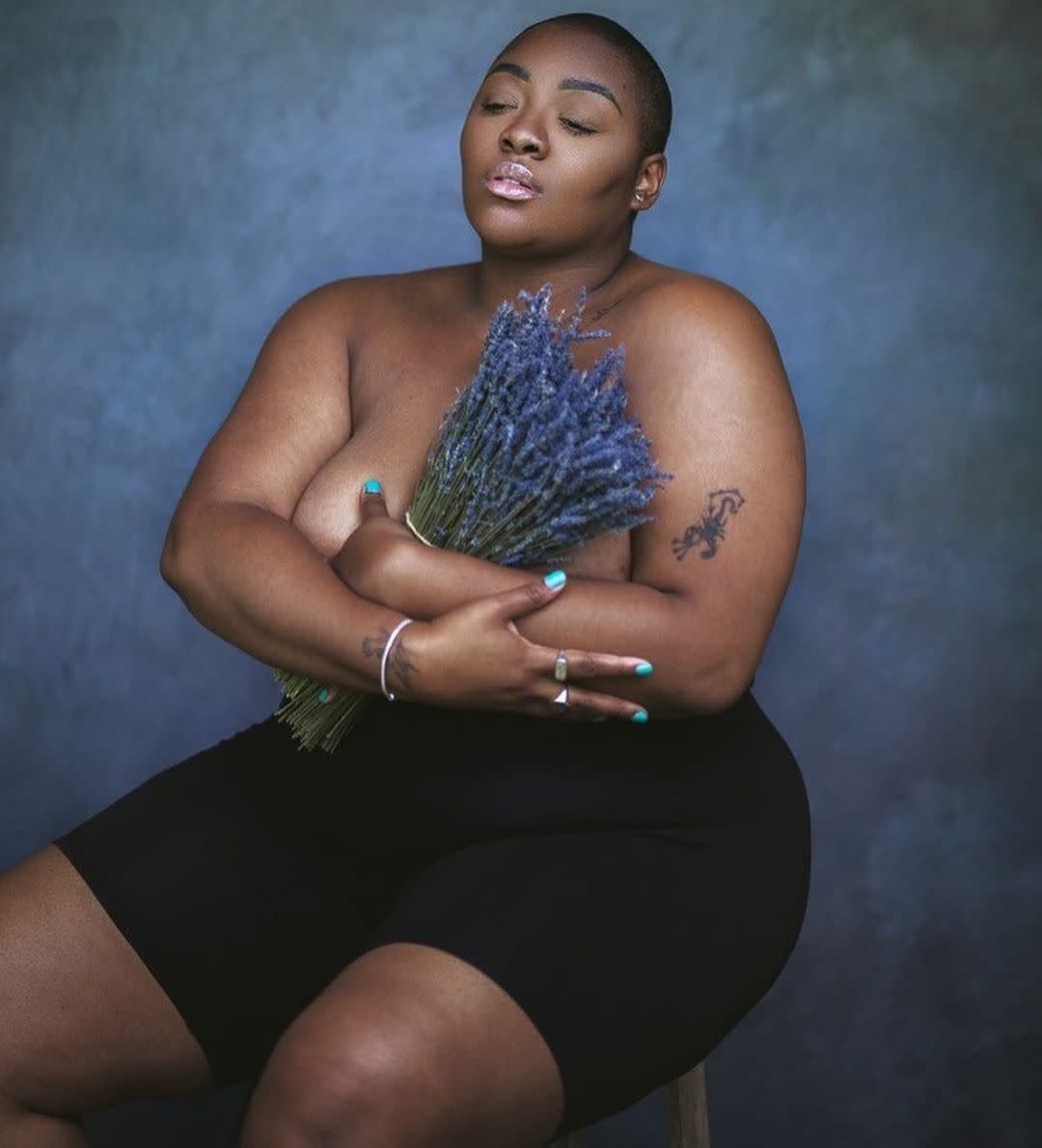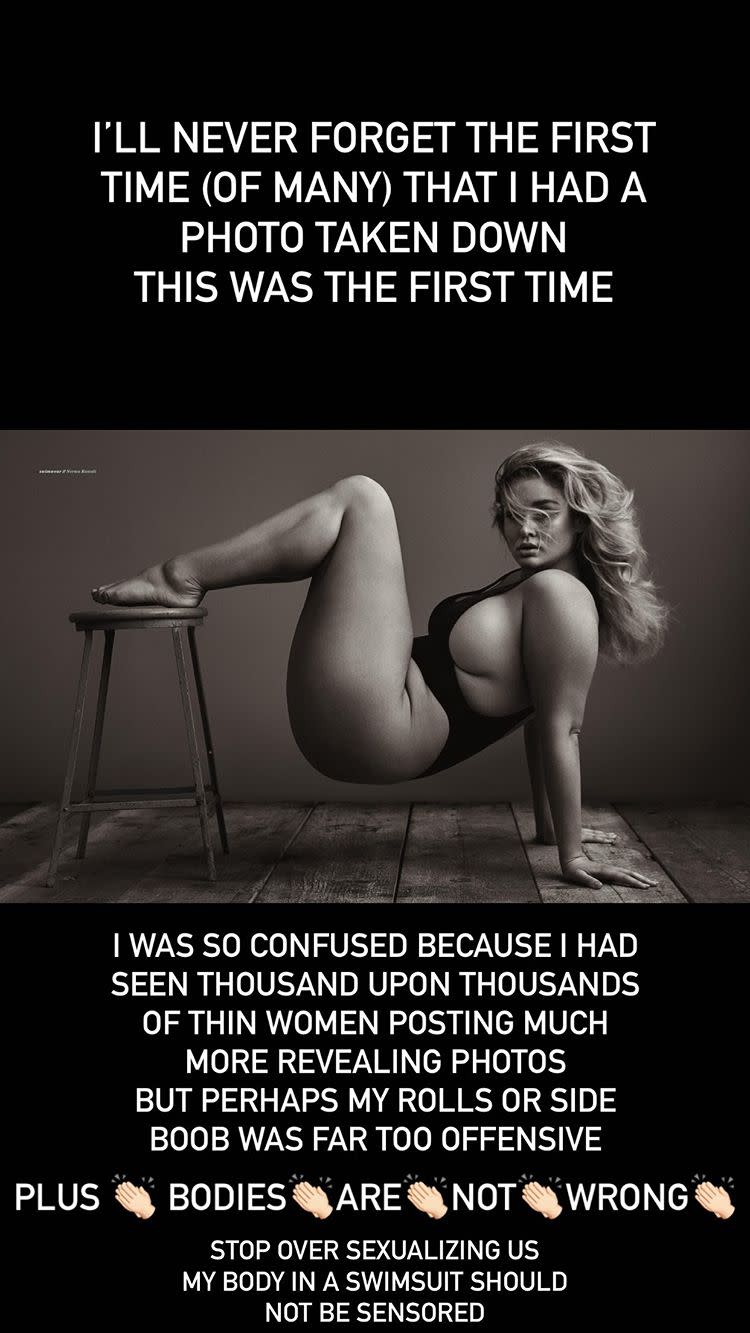Plus-size model who influenced Instagram to change policy speaks out: 'Black fat bodies are censored'

Instagram is changing its policy in response to a viral campaign started after a photo of a topless Black plus-size model was removed from the platform and said to be a violation of community guidelines. But in the wake of the announcement that the platform is changing its rules around the identification of breast squeezing in particular — something that Instagram representatives say is most commonly associated with pornographic content — the woman who led the charge, Nyome Nicholas-Williams, explains that it might not be enough.
The British model, who has posed for Vogue Italia and Dove, posted a photo of herself embracing her chest on Instagram back in July, when she was met with praise from her followers. Moments after posting, however, the photo was removed with a notification that identified it as a violation. Nicholas-Williams immediately took issue with it and began to fight the decision with the campaign #IWantToSeeNyome, created with the help of activist Gina Martin and the photographer who took the picture in question, Alexandra Cameron.
“Why the image was removed in the first place is the issue. It opens up a much bigger conversation [than] just an image being removed from an Instagram feed,” she tells Yahoo Life. “It showed that on social media there isn’t a level playing field, and there are biases at play that need to be addressed.”
When first speaking on the issue back in August, she explained that she felt she was being treated unfairly and even differently from other people on the platform, writing in an Instagram post, “Why are white plus-sized bodies seen as ‘acceptable’ and accepted and Black plus-sized bodies not?”
A post shared by Nyome Nicholas - Williams (@curvynyome) on Jul 30, 2020 at 8:03am PDT
She didn’t only pose the question to her audience, but also to the head of Instagram, Adam Mosseri, and members of the U.K. Instagram team. “I asked why this was an ongoing issue and what they were planning to do to protect the Black plus-size community and ensure that we can post and be heard on the platform, the same as everybody else,” she explains.
A post shared by Nyome Nicholas - Williams (@curvynyome) on Sep 10, 2020 at 3:18am PDT
In September, she penned and published an open letter to Instagram with additional support from activists such as Munroe Bergdorf, Jameela Jamil, Kelechi Okafor and Nathalie Emmanuel. There, Nicholas-Williams further urged the platform to “take responsibility for its internalized racial bias” with evidence that “millions of other notable influencers or slim, white celebrities” were able to post photos of themselves more exposed.
On Wednesday, Instagram and Facebook updated their policy “to help ensure all body types are treated fairly,” Instagram communications representative Liza Crenshaw tells Yahoo Life. “With the new update, we’ll allow content where someone is simply hugging, cupping or holding their breast. And, if there’s any doubt, we’ll ask that reviewers allow the content to stay up. We do have to draw the line somewhere, so when people squeeze their breast in a grabbing motion with bent fingers or if there is a clear change in the shape of the breast, that content will still break our rules.”
Crenshaw explains that the guidelines are put in place to make the content on the platform appropriate for users who are as young as 13 years old. However, they are not intended to limit an individual’s creative expression. “That policy as it was written has really been disproportionately impacting people from our plus-size community,” she says of the breast squeezing policy in particular.
Others within the community have also shared their experiences, including model Hunter McGrady, who acknowledged the news by posting the first of many photos that she has felt have been unfairly removed from Instagram.

“I was so confused because I had seen thousands upon thousands of thin women posting much more revealing photos,” McGrady wrote on Instagram Stories Wednesday. “Plus bodies are not wrong.”
Still, Nicholas-Williams calls the change a “great starting point” while remaining focused on the impact Instagram’s policies have had on people of color in particular. “In short, white plus-sized bodies still hold privilege, even when plus-sized. White plus-sized bodies will always been deemed as more acceptable than that of Black fat bodies,” she says. “There are so many nuances surrounding this conversation and the fact that Black fat bodies are censored over any other would explain the impact the policy has in direct relation to policing of Black bodies.”
And while the policy change has been reflected within Instagram’s community guidelines, Mosseri acknowledged in his tweet announcing the news that “policy might take a bit of time to take effect.” Crenshaw further explains this as an ongoing process of training 15,000 human content reviewers while simultaneously updating the algorithm that flags the content in the first place.
“We are updating the training of our algorithms that look for this type of content and we’re actively adding in more body types, different races, nonbinary bodies so that our machine learning can know when to recognize those bodies and make sure that they’re not being trained on a certain body type or a certain race,” she explains. “In adding that diversity, we hope that our machine will get better at recognizing diverse bodies.”
Although the breast squeezing policy is the one that Instagram has prioritized, Crenshaw says that the company is taking a larger look at community guidelines to figure out ways to make changes when necessary. The platform has also committed to continuing conversations with Nicholas-Williams and other users.
A post shared by Nyome Nicholas - Williams (@curvynyome) on Oct 28, 2020 at 8:45am PDT
“The work certainly isn’t over, there are still conversations surrounding biases that will still need to be had. But for now, this is a huge victory, yes,” Nicholas-Williams says. “ It means a whole lot, as it has been three long months but we pushed through. My team and I have sparked a change that will help everyone.”
Read more from Yahoo Life:
Want lifestyle and wellness news delivered to your inbox? Sign up here for Yahoo Life’s newsletter.



